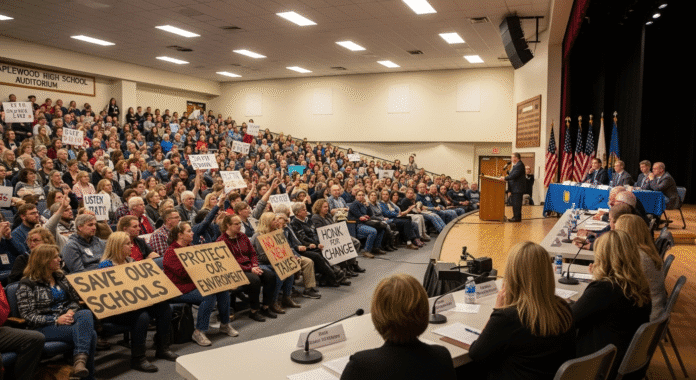A heated town hall in Wisconsin spotlights the real-life impact of Trump tariffs on local communities and industry.
In a clash that captured the deep divisions in American trade policy, Republican Rep. Bryan Steil was met with loud boos while defending former President Trump’s tariffs at a town hall in Elkhorn, Wisconsin. The intense reaction from a largely local audience revealed the mounting frustration of voters concerned about rising prices and job losses, highlighting how national policies affect everyday life in swing states.
A Night of Tension and Debate
On July 31, 2025, more than 200 residents gathered at Elkhorn High School’s auditorium in Wisconsin. As soon as Rep. Steil took the stage to support Trump’s tariff policy, the air grew tense. Amid cheers and jeers, Steil argued that these tariffs were essential to protect American industry, maintain fairness in global trade, and ensure that foreign nations played by the rules.
Steil explained, “This really at its core needs to be an opportunity to make sure that other countries are treating the United States fairly.” However, his words did not ease the crowd’s anger. Boos erupted regularly, and several audience members voiced their opposition with fervor. One distraught constituent shouted that the tariffs were a “terrible tax,” while others criticized Steil for being merely a “rubber stamp” for Trump. The crowd showcased protest signs calling for resistance and demanding protection for social services such as Social Security and Medicare.
Understanding Trump Tariffs: Policy and Purpose
Trump tariffs are a set of import taxes designed to protect American industries by making imported goods more expensive. The policy was intended to reduce the trade deficit, shield domestic manufacturing, and force other countries into fairer trade negotiations. Proponents insist that tariffs help level the competitive playing field for U.S. companies. Supporters maintain that:
- Tariffs protect American jobs by discouraging cheap imports.
- They help reduce the trade deficit by lowering the volume of foreign goods.
- Increased import costs can lead to higher demand for locally produced products.
- Tariffs generate additional revenue for the federal government.
Rep. Steil, along with other Republican lawmakers, echoed these points, arguing that strong tariffs create the necessary leverage to negotiate improved trade deals on behalf of the United States. The promise of better industry practices and the protection of national security were also key elements in his defense of the policy.
Impact on Local Industries: Agriculture and Manufacturing in Wisconsin
Agricultural Challenges
Wisconsin’s economy, strongly dependent on agriculture, has suffered significant setbacks from the tariffs. Dairy and crop farmers have been among the worst hit. For example, Wisconsin’s famed dairy sector—a vital part of the state’s identity and economy—has experienced a drop in exports. Retaliatory tariffs imposed by China, Canada, and Mexico have made it more difficult for Wisconsin farmers to sell products abroad. Export revenues, which once reached $1.275 billion annually, have fallen as foreign markets react to the increased cost of U.S. dairy products. One local farmer, speaking at a community forum, described the tariffs as “devastating,” adding that rising input costs have further strained an already vulnerable industry.
Manufacturing Woes
Wisconsin’s manufacturing sector has also taken a hit. Businesses reliant on steel, aluminum, and other raw materials now face higher production costs. Local manufacturers have reported that increased prices for imported materials have squeezed profit margins and forced some companies to consider shifting production overseas. In particular, high-profile companies like Harley-Davidson have been reported to adjust their manufacturing strategies to circumvent the negative impacts of retaliatory tariffs. One industry leader described the situation as a “Wild West” on factory floors, where uncertainty and rising costs threaten long-term viability.
The Numbers Behind the Costs
The economic fallout in Wisconsin is not merely anecdotal. Recent studies have indicated that:
- Wisconsin’s manufacturing exports, valued at over $3 billion annually, are experiencing significant disruptions.
- Nearly 10% of the workforce in the state feels the adverse effects of tariff-related job losses, compared with 6% in neighboring regions.
- Economic projections suggest that a 10% tariff could contribute to a rise in consumer prices by approximately 0.4% per year, placing additional pressure on families already coping with high living costs.
Voices from the Field: Support and Dissent
Arguments in Favor
Supporters of Trump tariffs maintain that the policy is a necessary corrective to what is perceived as decades of unfair trade practices. Proponents argue that tariffs:
- Promote fair trade by forcing other nations to adhere to equitable standards.
- Protect key industries from cheaper imports, thereby preserving American jobs.
- Serve as a tool for negotiating better terms in international trade agreements.
- Generate federal revenue that can be used for other government initiatives.
Republican leaders, including Rep. Steil, insist that while tariffs may bring short-term discomfort, they set the stage for long-term gains. Advocates highlight temporary boosts in domestic production and point out that revenue generated from tariffs can be reinvested in essential public projects.
Counterarguments and Criticisms
Critics from both the economic sphere and local communities argue that the tariffs are predominantly harmful. Economists warn that increased tariffs act like a hidden tax, driving up the cost of everyday goods. A Reuters/Ipsos poll from April 2025 revealed that 70% of Americans believe tariffs lead to higher consumer prices, which directly impacts the purchasing power of working families.
Wisconsin Democrats, including figures like Senator Tammy Baldwin and Governor Tony Evers, have voiced strong opposition. Baldwin warned that the tariffs would “jack up the price of virtually everything,” and Evers underscored the negative impact on local agricultural exports. These critics point to retaliatory measures imposed by foreign countries that have not only reduced export opportunities but also led to job losses and economic instability in sectors crucial to Wisconsin’s economy.
Critics also contend that the use of tariffs undermines long-standing international trade relationships. The retaliatory tit-for-tat measures have sparked global trade tensions, affecting not only large-scale industries but also small businesses and consumers alike. For many voters, the immediate rise in costs and uncertainty in the job market is too steep a price to pay.
Public Opinion in Wisconsin: A Divided Landscape
Recent polling data paints a clear picture of public sentiment around Trump’s tariffs, especially among Wisconsin’s swing voters and independents. Nationwide, there is growing skepticism about whether tariffs truly benefit American workers. In Wisconsin, where both agriculture and manufacturing form the backbone of the economy, discontent runs high.
A Reuters/Ipsos poll indicates that 62% of Republicans nationwide acknowledge that tariffs increase consumer prices, with independents showing even higher levels of concern. In Wisconsin, these concerns are deeply felt. Many voters, alarmed by rising everyday costs and the uncertainty of export markets, view the tariffs as a misstep that disproportionately affects their communities.
As one protester at the town hall put it, “What dire economic circumstances put Trump in a position to deploy tariffs on over 190 countries?” Such questions reflect a broader questioning of whether these trade policies adequately address the challenges faced by American workers or merely serve political interests.
The Political Stakes: Implications for Future Elections
The fallout from the town hall event is more than just a local controversy. With Wisconsin being a key battleground state, the response to Trump’s tariff policies could have far-reaching implications in upcoming elections. As voters become increasingly dissatisfied with the economic hardships imposed by these policies, Republicans may find themselves having to balance traditional support with rising demands for change.
The event at Elkhorn High School served as a stark reminder that political rhetoric must increasingly confront everyday realities. For Congress and the White House, adapting trade policies to mitigate these immediate economic pressures while pursuing longer-term strategic goals will be essential. Meanwhile, the intense local reaction highlights the critical need for policymakers to engage directly with the communities most affected by these decisions.
Engaging in the Debate on Trade Policy
The town hall in Wisconsin did more than showcase a heated political moment—it brought the complex debate over trade policy directly into the lives of local communities. As residents grapple with the tangible effects of Trump tariffs, the conversation is no longer about abstract economic theories or distant policy debates. It is about real jobs, rising prices, and the future of local industries.
The contentious debate witnessed at the town hall invites readers to consider their own views on trade policy. Are the tariffs truly a mechanism to protect American jobs, or do they imperil the economic stability of communities that fuel the nation’s industries? Your viewpoint matters. Share your thoughts in the comments, and join the conversation shaping the nation’s economic future.
Trump Tariffs Slash Upstate NY Tourism, 400K Fewer Border Crossings




